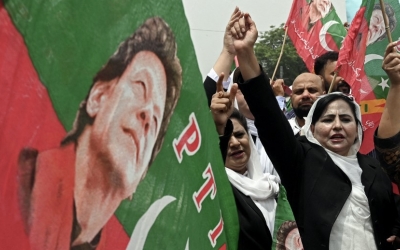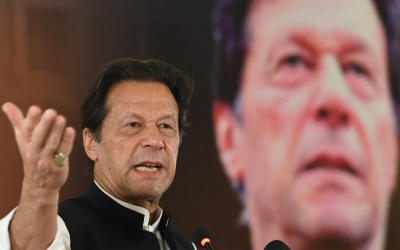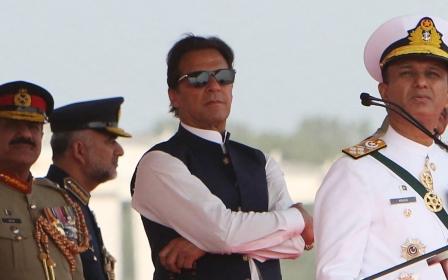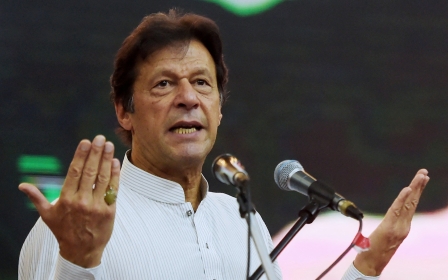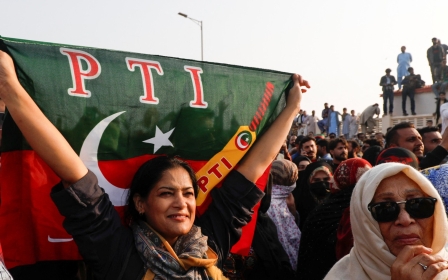Why Imran Khan must become Oxford University's next chancellor
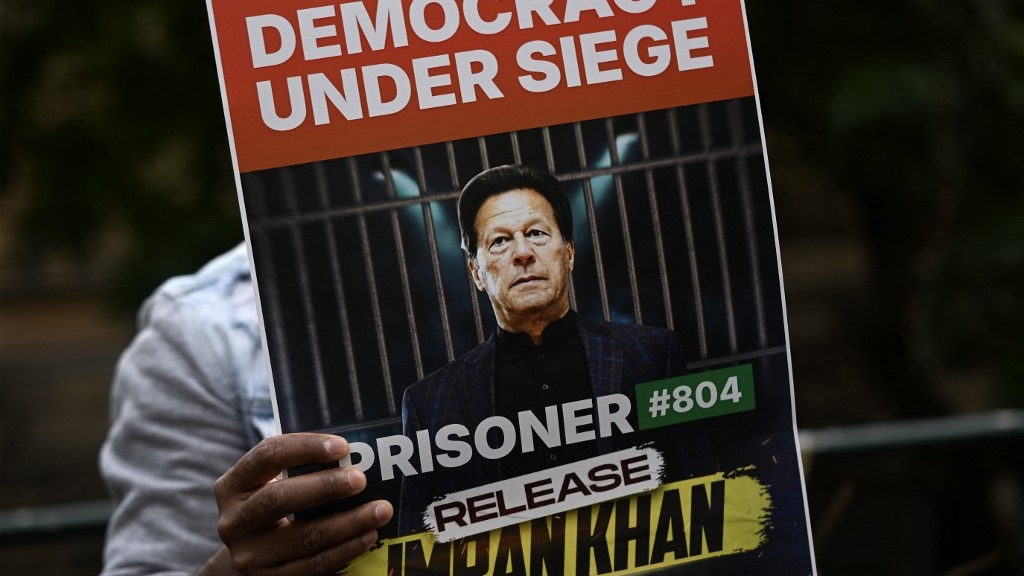
The duties might be minimal, but there are few roles in British public life as revered as chancellor of Oxford University.
Some of the most famous figures in UK history have occupied the role, including Oliver Cromwell, the Duke of Wellington, George Curzon and, more recently, Harold Macmillan, one of Britain’s most admired prime ministers.
Imran Khan could add to the list of prime ministers who have been chancellor of Oxford. This alone makes him a far more distinguished candidate than the two main rivals who have so far emerged to challenge for the job: Peter Mandelson, a minister under the Tony Blair government, and William Hague, foreign secretary under David Cameron.
Worthy and respected, perhaps - but mediocre and unadventurous candidates.
By throwing his hat into the ring on 18 August, Khan electrified the contest.
New MEE newsletter: Jerusalem Dispatch
Sign up to get the latest insights and analysis on Israel-Palestine, alongside Turkey Unpacked and other MEE newsletters
He is a political prisoner in Pakistan. It is an open secret that Khan is in jail for challenging the stinking, corrupt and rotten two-party system that has thwarted Pakistan’s democratic process for half a century.
He has mounted his national challenge through the political party he created, Pakistan Tehreek-e-Insaf.
It translates as Movement for Justice, and embodies the exact values of freedom and justice Khan learned as a student of politics and economics at Oxford’s Keble College 50 years ago.
Khan has sacrificed everything, and endured two assassination attempts, in pursuit of those superlative Oxonian values.
Now he wastes away in solitary confinement in a Pakistani jail.
Power and moral strength
When and if Khan emerges from prison he will be the most revered and popular man in his country, with the power and moral strength to challenge the spoils system and arbitrary rule that has held Pakistan back for so long.
Khan, it should be borne in mind, also has international enemies. From the very start, he sought to forge an independent Pakistani foreign policy. This made him a brave and eloquent opponent of former US President George W Bush’s war on terror - and especially the torture and illegality that went with it.
When, after a long struggle, he became prime minister in 2018, he refused point blank to become a pawn of the United States.
There have been many reports that the US worked to undermine him. Anyone with even a passing interest in the history of Pakistan knows that they are not fanciful.
Ever since independence in 1947, the US (helped by Britain) has treated Pakistan like a vassal state. The last thing the US wants is a Pakistani leader who speaks up for the Oxonian values of freedom and justice.
This is why anyone who cares about the plight of Palestinians must surely support Khan for chancellor of Oxford University.
Scroll through the record of lords Mandelson and Hague when it comes to Israel’s war crimes and atrocities in Gaza. You will find nothing.
Yet even from jail, and under constant surveillance and censorship, Khan has found ways of making known his anguished concern.
Indeed he spoke out as recently as 19 August, in an interview with ITV, when he warned the Keir Starmer government that: “The world is watching them and looking to them for leadership, especially in light of the horrific situation in Gaza and the erosion of democratic principles globally.”
What a contrast between the bravery and high principles of Khan, speaking out under duress from jail, and the complicit silence of Mandelson and Hague in the comfort of the House of Lords.
Vote of protest
It is worth dwelling too on the contrast between Khan and the US-sponsored Arab dictators who have shamefully abandoned the Palestinian people. A vote for Khan as chancellor of Oxford would be, among other things, a vote of protest against British complicity in the slaughter in Gaza.
That is why, as night follows day, we should expect an attempt by the British establishment to block Khan’s candidacy.
Many Pakistanis speak of the "London plot" that brought him down. His idealism, decency and raw courage have made him a deeply inconvenient figure for the US and Britain.
Many will see either Hague or Mandelson as safer and more amenable figures.
Let’s not forget that Hague as British foreign secretary enabled the catastrophic military intervention in Libya. Mandelson runs Global Counsel, a corporate advisory service. In government, as Tony Blair’s close adviser, he gave his backing to the illegal invasion of Iraq.
His idealism, decency and raw courage have made him a deeply inconvenient figure for the US and Britain
Who truly stands for Oxford’s values? Mandelson? Hague? Or Khan, an inspirational figure who has risen to the top of two hugely competitive fields: sport and politics?
He captained Oxford University’s cricket team, then enjoyed a superlative career as a Pakistani cricketer, leading his country to victory in the 1992 World Cup. He then dedicated himself to building the Shaukat Khanum Memorial Cancer Hospital, named after his mother, before entering national politics.
He has written several excellent books, of which I would especially recommend his partly autobiographical treatise, Pakistan: A Personal History, which sets out his political vision.
Moreover, Khan already has deeply relevant experience as a long-standing chancellor of Bradford University, where his performance was widely praised.
To be fair, Mandelson has a good record as chancellor of Manchester Metropolitan University.
I am well aware of powerful criticisms of Khan’s premiership inside and outside Pakistan. Human rights went backwards, many organisations reported, while media freedoms diminished (though on nothing like the scale that has occurred recently).
Religious extremism persisted, while laws against apostasy and blasphemy remained in force. His courageous stance for Palestinians was not matched for the Muslim Uyghur people.
Khan would be able to answer these criticisms and more – to the people of Pakistan and to Oxonians worldwide as their chancellor – if he were at liberty.
He accepts the right of people to judge him in open debate, in uncensored media, after fair elections.
And that is the supreme argument for voting for him. He alone of the candidates so far would demonstrate Oxford’s commitment to justice and democracy.
International disgrace
Admittedly Khan will not, ahem, be immediately available for ceremonial duties. But many in Pakistan believe his release will be only a matter of time.
Last month, the United Nations Working Group on Arbitrary Detention found that Khan’s imprisonment was "arbitrary", adding that the “appropriate remedy would be to release Mr Khan immediately and accord him an enforceable right to compensation and other reparations, in accordance with international law”.
There is one overlooked factor in Khan’s favour. Thanks to a recent change in the rules, Oxford graduates can now vote remotely. That means that Oxonians from around the world can express their support for a political prisoner whose treatment has become an international disgrace.
It would also send an important message. Three previous Pakistani prime ministers - Liaquat Ali Khan, Zulfikar Bhutto and his daughter Benazir - attended Oxford. Two of them were assassinated and one (Zulfikar Bhutto) was judicially murdered.
A little more difficult, perhaps, to kill an Oxford chancellor.
The election of Khan would also, in my opinion, benefit Oxford.
It is a great university but voting for Mandelson or Hague would send out a worrying message that Oxford - like post-Brexit Britain - has become inward-looking.
With Khan as chancellor, Oxford could send a message to the world that it is open to scholars not just from Eton but from Ethiopia; not just from Marlborough but also Mumbai; from Lahore as well as London.
Above all, it would tell the world that Oxford University was still a beacon of freedom and justice.
The views expressed in this article belong to the author and do not necessarily reflect the editorial policy of Middle East Eye.
Middle East Eye delivers independent and unrivalled coverage and analysis of the Middle East, North Africa and beyond. To learn more about republishing this content and the associated fees, please fill out this form. More about MEE can be found here.



